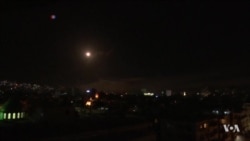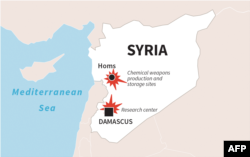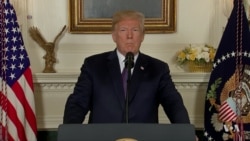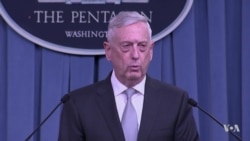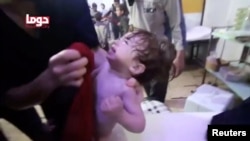Military planners and U.S. President Donald Trump are hailing the U.S.-led airstrikes on Syrian chemical weapons facilities as a complete success, with every missile hitting its target.
The United States, France and Britain launched the strikes early Saturday morning, dropping 105 missiles on three Syrian chemical weapons facilities — one in the capital of Damascus and two others near Homs, near the border with northern Lebanon.
U.S. military officials said all of the missiles hit their targets within minutes of each other, reducing the facilities to rubble.
"We've attacked the heart of the Syrian chemical weapons program," Lt. Gen. Kenneth McKenzie told Pentagon reporters Saturday.
"This has dealt them a very serious blow," he said. "I think the words cripple and degrade are good accurate words."
The U.S. said all three of the targets — the Barzah Research Center in Damascus and the storage facilities near Homs — were involved in the production and deployment of both chlorine and sarin gas, but that initial assessments of the strikes showed no indications any of the chemical agents had been released into the air as a result.
WATCH: President Trump Announces Strikes Against Syria
The U.S. rejected accusations that civilians may have been killed in the joint operation, but left open the possibility some civilians could have been hurt by Syria's counter measures.
McKenzie said Syria launched 40, non-guided, surface-to-air missiles in response to the strikes on the three chemical weapons facilities, and that the vast majority of them were fired after the U.S.-led strikes were over.
"When you shoot iron [missiles] into the air without guidance, it's going to come down somewhere," he said.
The Syrian Foreign Ministry Saturday condemned what it called "the brutal American-British-French aggression …which constitutes a flagrant violation of international law."
Russia, Syria's ally and a key backer of President Bashar al-Assad, decried the U.S.-led operation as a failure, saying the majority of the rockets fired at Syria were intercepted by the Syrian government's air defense systems.
U.S. military officials dismissed such claims, calling the Syrian response "remarkably ineffective." Officials also said Russian air defense systems were not used to thwart the strikes.
Prior to the Pentagon briefing, U.S. President Donald Trump took to Twitter to declare the strikes a success.
"A perfectly executed strike last night," Trump tweeted. "Could not have had a better result. Mission Accomplished!"
The phrase "mission accomplished" has become somewhat notorious in U.S. political discourse after it was used on a banner that hung behind former U.S. President George W. Bush during a 2003 speech about the Iraq War. The war dragged on for years after, and the phrase became synonymous with the Bush administration's failures.
Still, Pentagon officials defended Trump's use of the words.
"Last night, operations were very successful. We hit our objections," said Chief Pentagon spokeswoman Dana White. "So, it was mission accomplished."
"I'm not gonna say they'll be unable to conduct a chemical attack in the future," said Lt. Gen. McKenzie. "I suspect however they'll think long and hard about it based on the activities of last night."
Yet there are questions about the long-term impact.
"Strategy hasn't been this administration's strong suit — Assad and Putin aren't going to flinch fast and will easily endure military strikes," Brett Bruen, a former director of global engagement at the White House, told VOA.
"This only works if they can keep up strong diplomatic pressure on Syria, Russia," he said. "Otherwise, they will worsen our position and the situation on the ground."
Some U.S. officials likewise remain wary, warning prior to the strikes that while Syria's use of chemical weapons cannot be tolerated, much more is at stake given the backing the Syrian government gets from Moscow.
"This is a chess game and the Russians are ratcheting up the pressure," a U.S. official told VOA on the condition of anonymity given the sensitivity of the situation.
"They're playing dirty," the official added. "We need to think two or three steps ahead."
U.S. officials said, so far, they have not seen any attempts by Syrian government forces, or its allies to retaliate, though they have coordinated with U.S. allies in the region as a precaution.
President Trump warned Friday the U.S.-led strikes could be just the first step in a sustained response to Syria's ongoing use of chemical weapons. But just hours later, U.S. Defense Secretary Jim Mattis described the operation as a "one-time shot."
WATCH: U.S. Defense Secretary Mattis Briefs Reporters in Syria Strikes
"What happens next has everything to do with what the Assad regime decides to do. It has everything to do as well with what Russia decides to enable," the Pentagon's White told reporters Saturday.
The decision to strike, made after consultations between Washington, London and Paris, came after military and intelligence officials concluded the Assad government was indeed responsible for a chemical weapons attack on the town of Douma last Saturday that killed more than 40 people, including women and children, and sickened hundreds more.
The three nations have expressed a high degree of confidence the attack used chlorine gas, and that it also likely used another chemical agent, possibly sarin. But the Pentagon said Saturday it was still assessing the evidence.
The Organization for the Prohibition of Chemical Weapons said in a statement Saturday it will continue to investigate the allegations of chemical weapons use in Douma.
The OPCW investigators who are in Syria on a fact-finding mission connected with last week's attack on Douma said they have been "working in close collaboration with the United Nations Department of Safety and Security to assess the situation and ensure the safety of the team."
Wayne Lee, Steve Herman at the White House; Katherine Gypson and Aru Pande in Washington




